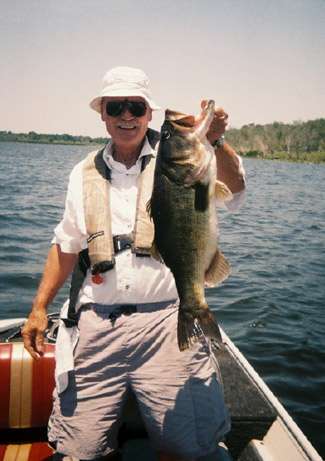
I became a Charter Member of BASS on May 23, l969. I have somehow managed to keep up with my certificate, signed by the one and only Ray Scott. In the early 1960s I lived in Memphis, Tenn., and bass fished in the oxbow lakes off the Mississippi River.
One of my favorite destinations was Lake View, just across the state line into Mississippi. I could go there and rent a 14-foot johnboat and use my trolling motor. On one such occasion, I was a little late getting to the boat dock and all boats were rented. A fisherman standing behind me, waiting to pay his ramp fee, invited me to join him for a couple of hours' fishing time.
I was really impressed with this fisherman's boat. It was a 15- or 16-foot aluminum john-type boat with pedestal seats. The center console seat was altered to lift up for storage, and this guy had more lures than our local Wal-Mart store. He had a great trolling motor and a flasher depthfinder. It did not get any better than that!
We made our first stop about 100 yards off a long point. I had never heard of catching a bass more than 10 feet away from the bank. He explained there was a brushpile in about 10 feet of water, and he pointed me in the direction to cast. He did this through out the next two hours or so, and we caught some very nice bass. It was my first time to fish "offshore" — and my first time to meet Bill Dance.
In the early 1960s the local bass clubs were growing like the infamous kudzu vines in the South. However, it was not until Ray Scott formed BASS that the bass clubs had a united foundation. BASS raised the bar for club conduct, ethics and fishing standards. During this time period I was a member of the Memphis Bass Club and The Chickasaw Anglers Bass Club. While both clubs held their own tourneys, we also challenged and accepted challenges from other bass clubs in Tennessee, Mississippi and Arkansas. While the foundation for such tourneys to be conducted were laid down by BASS, perhaps the most important impact BASS had — then and now — was the catch-and-release policy.
Joining BASS was never a decision to be made but rather it was an opportunity to learn from the professional bass fisherman. With Bassmaster Magazine, we amateurs could find out first hand about new lures, equipment and fishing techniques for all different types of water. Information that would not normally be available to us, or would take years to accumulate, was now available each month.
In the 1970's I moved to Nashville, Tenn., and fished mostly Kentucky and Barkley lakes. I had three sons who shared my enthusiasm for bass fishing. It was mostly through Bassmaster Magazine that we learned about jig fishing, Carolina rigs, and deep kneel-and-reel crankbaits. Kentucky and Barkley lakes were about currents, ledges and drops.
For the next 25 years we were able to be very competitive on the local level in bass tournaments.
About 5 years ago, my wife and I moved to central Florida and said good-bye to deep water fishing and hello to shallow water and heavy vegetation. This was about the time that BASS returned to fish the Harris Chain of Lakes after several years' absence. Bassmaster once again provided us with the many ways to fish the Florida waters. Within the past three years, I have caught five of my biggest bass ever, with my personal Moby Bass weighing 12 pounds, 2 ounces. I can think of several reasons to stay a member of BASS, but for me, that says it best.
I've been asked to list highlights from my bass fishing career. Well, it has nothing to do with the many tournaments I fished. The trophies are mostly in the attic, and the pictures are in the scrapbook. What stands out the most are the many, many bass trips I was fortunate enough to have with my family. That would have to rank No. 1. Of course, No. 2 would have to be my personal Moby Bass.
(Wayne Barksdale, 71, retired as resident officer for The National Labor Relations Board in Nashville, Tenn., and now lives in The Villages, Fla., where he is a member of The Villages Freshwater Fishing Club. The 300-member club is active in helping stock fish in local lakes, and it provides youngsters with equipment and opportunities to go fishing.)
